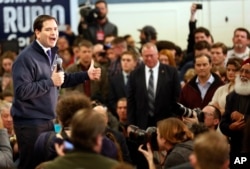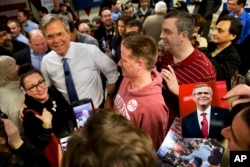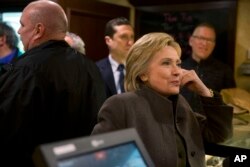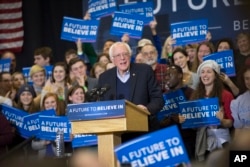Once every four years, the Northeastern state of New Hampshire becomes the center of the U.S. political universe with its first-in-the-nation presidential primary.
What's unusual about New Hampshire is how seriously the voters take their role and the responsibility of being among the first to weigh in on the candidates.
That was evident at a home game for the Manchester Monarchs ice hockey team. Kelly and Sean Carey from Hudson came out for a date night.
“Just a night out, we have a little boy at home. So it is just kind of a chance for us to get out and have some fun before we go back home for our parental duties,” said Kelly Carey, who added it was good to get away from the political phone calls and door-to-door campaigners at home.
Still mulling options
Her husband, Sean, has been thinking about his primary vote on Tuesday, but has yet to decide on a candidate. “Not yet, not yet. It is still up in the air. I mean it is pretty close, but it's going to come down to the crunch hour, definitely," he said.
Plenty of fans at the hockey game could not have cared less about Tuesday's vote.
“I don't care about the primaries,” said Fran Sullivan of Manchester. Her cousin, Angel Lemerise, quickly added, “We don't pay attention to the primaries. We just come for the hockey game.”
Unique voter role
New Hampshire is unique for that close candidate-voter interaction, and Evan Marks has been taking advantage.
"You know it really is a great state to be able to come out here and see them [presidential candidates] all. We are very fortunate to have the ability to meet them personally,” Marks said at a recent rally for Republican candidate Marco Rubio. “Not many other states can say that and they hang around quite a bit, so whether you want to see them or not you see them.”
Sometimes the vetting role of New Hampshire voters is passed from generation to generation.
At a get-together for Republican contender Chris Christie, one woman, who preferred not to give her name, brought her grandson. “He and his grandfather have seen Jeb Bush and we all went to see Lindsey Graham at a house party in town," she said.
It's those personal connections and intense candidate scrutiny that characterizes New Hampshire, said Chris Galdieri, assistant professor of political science at Saint Anselm College in Manchester.
“If you go to these town halls and other events that candidates are having, you will hear voters asking really serious policy questions, and really saying, you know, 'I'm not committing to a candidate until I find out what they think about this issue that I care about,' " Galdieri said.
Long, rich history
The New Hampshire presidential primary has been the first in the nation since 1920. But up until the early 1950s, the voters here voted for national convention delegates and their candidate allegiances were not always known.
The actual names of candidates were placed on the ballot beginning in 1952, and the primary vote tallies began to match the delegate count only after Democratic Party reform, which stemmed from the chaotic Democratic National Convention of 1968.
The Democratic nominee that year was Vice President Hubert Humphrey, who did not win a single primary. Humphrey went on to lose the general election that year to Republican Richard Nixon.
Of the past 20 primary winners in both parties, 15 went on to win their party nomination.
But New Hampshire, like Iowa before it, has a mixed record of picking eventual presidents. For example, eight years ago, Barack Obama encountered a New Hampshire speed bump on his way to the Democratic nomination, losing to former first lady Hillary Clinton.
Long campaign slog
Many candidates begin visiting New Hampshire up to two years before the primary. It is also a draw for domestic and international media.
New Hampshire's small town backdrops and majestic scenery are a natural draw for television.
About 40 percent of New Hampshire voters are “undeclared” or unaffiliated with any major political party. That can make for some unpredictable results. In fact, discussions with numerous voters at candidate rallies in recent days confirms the notion that many voters have not made up their minds and won't until just before the primary on Tuesday.
The New Hampshire primary often surprises and this year is likely to be no exception.
Democrat Bernie Sanders and Republican Donald Trump lead in the latest polls, but the battle for second place among the Republican contenders could be especially fierce.
Rubio, Ted Cruz, Jeb Bush, John Kasich and Chris Christie are all banking on good showings Tuesday, and the results could be particularly important for the so-called establishment governors trying to make headway in the race: Bush, Christie and Kasich.
How many of them survive beyond New Hampshire is an open question.










